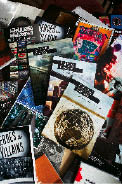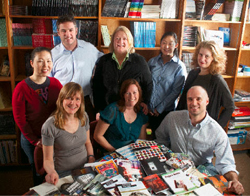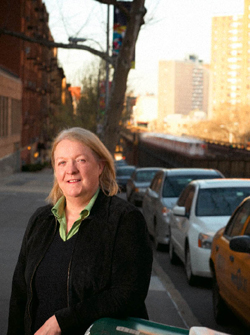A Teaching Life
In her journey to understand and re-conceive school-based literacy practices, Ruth Vinz is a point of contact between TC and city schools
Soon after Ruth Vinz joined the faculty of TC’s English Education program in 1993, New York State issued formidable changes requiring pre-service teaching students to serve two field experiences per year instead of one. It fell to Vinz, who had spent the previous 23 years teaching high school in Idaho, to partner with local secondary public schools to double TC’s field placements virtually overnight.
“It was no easy task, because we had a small cadre of schools where we were placing student teachers, and we needed to develop new partnerships that would be of mutual benefit to the schools and offer the best possible experiences for our students,” she says. “As a faculty member new to the city, my first months at TC were spent searching out potential placements and visiting schools from Brooklyn to the Bronx. Those contacts led to long-term partnerships that are robust today. Setting up the student teaching placements helped get me in the door, and, for that, I am forever grateful for the good will of teachers and school administrators who joined us to help educate the next generation of teachers.”
In essence, “getting in the door” is what Vinz, now the Enid & Lester Morse Chair and Professor in English Education/The Teaching of English, has been doing ever since, serving as an ongoing point of connection between TC and city schools. As the English Education program has grown steadily on her watch—from 50 students to nearly 250—she and her colleagues have helped create a continuous loop in which TC pre-service students student-teach in local schools while learning their craft; accept teaching jobs in those same schools after graduation; mentor subsequent pre-service students from the College in their classrooms; return to TC for advanced degrees; become school leaders; and, completing the cycle, work with the College to bring the next generation of student teachers to their schools.
One result, Vinz says, is that “we constantly foster new partnerships as our program grows.” Another is that Vinz and her colleagues and students have forged close and enduring relationships with individual schools that have enabled them to conduct outreach and research focused on adolescent “literacies”—the meanings that young people make from a variety of sources and how they communicate those meanings to different audiences.
The vehicle for this work has been the Morse Center for the Professional Education of Teachers, which Vinz founded in 2002, and which has since housed a number of different literacy-focused efforts.
One of the projects is TC’s Student Press Initiative (SPI), which Vinz and her then-student, Erick Gordon founded in 2002, and which Gordon has since expanded into one of the nation’s most innovative project-based professional development efforts. (See stories on pages 19 and 20.) SPI goes into classrooms and collaborates with teachers and students to write, rewrite, produce and publish project-based collections of student writing. These projects often involve community-based research, oral history projects, or discipline-specific essays of various types.
“I did this kind of work when I was teaching high school—I used to stand at the ditto machine and copy student writing so they could become the audience for each others’ thinking and learning,” Vinz says with a laugh.
“Ruth is with me in the classroom in every lesson I teach,” says Gordon. “Everything for her is about curiosity—laying down a path with students to help them create their own meanings and grow into their own understandings. She has given me the belief that I can carry my own sense of wonder and curiosity into the classroom and be a learner along with my students.”
Vinz’s scholarly interest is in “rethinking my understanding of literacies that help us read and write the myriad texts of the world”—the ways in which teachers construct their own literacies and make meaning of texts with their students. It’s a focus born very much of her own journey in the classroom, as she makes clear in a 1991 article that subsequently grew into her award-winning book, Composing a Teaching Life. In it, Vinz recalls listening to her grandmother read to her from the works of Mark Twain, The Brothers Grimm, The Arabian Nights, Basho and Lao Tzu.
“On her eastern Idaho farm in the mid-Forties, it was a time when most fathers had come home from the war and were well into the rhythms of their work and daily lives,” she writes. “Not mine. What remained was my mother’s memory of him, and the few trinkets and medals that were wrapped in tissue in a suit box...the rest was in the shallow earth of rice fields somewhere between Tokyo and Yokohama.”
“My grandmother, attempting to fill the space, shared with me the literature that she loved…I constructed a world of experience and imagining far beyond, where I lived and located myself within the spirit of the grandmother who led me into a life with literature. In the text of her reading more than in the text of the individual stories, the meaning of what she did and did not do stays with me.”
Vinz writes that later, as an English teacher, she at first “talked about literature in classrooms” while “students mostly watched,” until “finally, I realized that I had taken on a literature teacher’s identity, like putting on a new coat.” By sifting through memories of her own experiences with literature, she began to question “this socially constructed image of the literature teacher…and…negotiate the image and identity of the literature teacher that I was becoming.”
She also became immersed in understanding the cultural contexts that shape students’ reading and writing lives. Not surprisingly, that has put her in direct opposition to the widespread emphasis on standardized tests that often fail to reflect the individuality of both teacher and student.
Indeed, the Secondary Literacy Institute (SLI), another Morse Center initiative, has worked extensively with public school teachers to create curriculum-embedded assessments that are rooted in what’s actually being taught by teachers and structured to capture students’ reading and writing literacies. SLI has collaborated closely with, among other external partners, the Institute for Student Achievement, an organization led by the noted educator and advocate N. Gerry House that assists under-resourced schools in New York and five other states. Together with another center at TC, the National Center for the Restructuring of Education, Schools and Teaching (NCREST), SLI has worked with 30 ISA high schools in New York City to create “DYOs” (for “develop your own”)—alternative interim assessments that are aligned with the schools’ curricula rather than conducted through standardized tests provided by the city.
“We encourage teachers not to think of assessments as something that happens to students—an assessment is a point in time, when teachers and students reflect on what was taught and learned,” House says. “Teachers reflect on their own practices and students reflect on their learning as a result of working in this way. Many of our teachers are inexperienced, and Ruth and Jacqueline Ancess [Co-Director of NCREST; see story on page 21] have been very skillful in showing them how to design an assessment that corresponds to, say, a piece of literature that they’re teaching in their classes.”
Vinz says the common thread that links SPI, SLI and other Morse Center efforts is an emphasis on collaboration with schools that can be all too rare in and professional education initiatives..
“We don’t go in to do research ‘on’ teachers and classrooms—I’m a cynic about data raids in schools,” she says. “The Center is built on the principle of, ‘We create the partnership and the research grows out of the partnership.’ It’s project-based work that incorporates thoughtful participation in what it means to teach and learn. You work with their issues and concerns, and try to do some teaching while you’re at it.” She smiles. “Ultimately, I’ve learned so much more than I’ve taught anyone.”
Published Wednesday, May. 19, 2010


